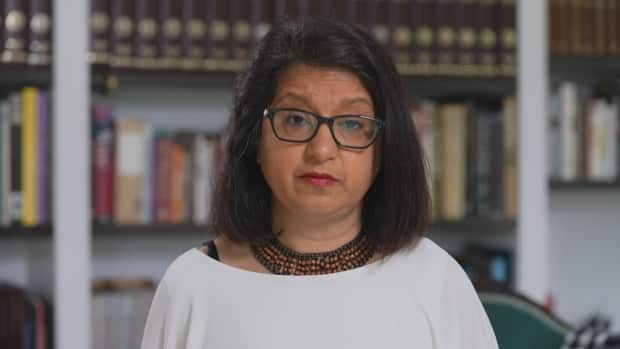Premier says he didn't tell systemic racism commissioner to shelve report

Premier Blaine Higgs says he didn't tell systemic racism commissioner Manju Varma not to publish her mid-term report.
But chiefs from nine Mi'kmaw communities say the commissioner told them the government wasn't prepared to accept her call for an immediate, Indigenous-led public inquiry.
Those chiefs withdrew from the process on Monday, alleging political interference in the commissioner's work.
A mid-term report from the commissioner recommended an immediate public inquiry that would examine systemic racism against Indigenous peoples in the justice and policing sectors.
The report was shelved following a meeting between the commissioner, Higgs and Aboriginal Affairs Minister Arlene Dunn.
Earlier this week, a senior policy adviser in Varma's office resigned. In his resignation letter, he questioned the independence of the commissioner's office from the government.
"As the first commissioner ever in the country, it's important it's independent," Higgs told reporters on Wednesday.
"I take great exception to someone saying I'm involved with this because I'm not."
During the meeting with Varma on April 13, Higgs said government representatives asked questions about how she got to the points she raised and he expressed concern that she hasn't met with the chiefs of the Wolastoqey Nation. They have declined to participate in Varma's process from the outset, describing it as an "ill-equipped and ineffective alternative to an inquiry."
"She decided, I have more work to do, I'll continue to work on meeting with everyone so we can finalize the path forward," Higgs said.
"That's kind of where it was left. So that was fine. But I certainly want it to be clear that there was never any sort of direction from me that she wasn't to issue it."
Chiefs say government wouldn't accept recommendation
But in a statement to CBC on Thursday, Mi'gmawe'l Tplu'taqn (MTI), a non-profit made up of the nine Mi'kmaw communities, said the government declined to accept the recommendation for a public inquiry.
"Unfortunately, after meeting with the Premier and the Minister of Aboriginal Affairs, the commissioner informed MTI that the government was not prepared to accept the recommendation for an independent inquiry, because there was insufficient data to support it," a statement from executive director Dean Vicaire says.

A letter sent to the commissioner from Aboriginal Affairs Minister Arlene Dunn on Wednesday says the government is looking for "a final report that contains solid professional statistics, analysis and recommendations respecting all of the communities that have been marginalized or subject to racism."
In an email to CBC, Varma said she met with MTI on May 17. She didn't refute that she told them the government wouldn't accept the public inquiry recommendation.
During that meeting, Varma said Dunn was concerned about the lack of discussion the commissioner had with departments.
"I too was concerned and felt that my work was not a priority for the government," Varma wrote. "I noted that the holes in my draft demonstrated community involvement but little government involvement."
Since the meeting, Varma said it's been easier to get information from government.
"I do not see this as interference, I see this as support."
She said no one, including Higgs and Dunn, have asked her to shelve, change or remove anything.
A lack of data
Over the last two years, Higgs has declined to call a public inquiry, saying there are recommendations from other reviews and national inquiries that could be implemented.
Varma's mid-term report says the commissioner examined recommendations from a number of previous reports and national inquiries, including the Truth and Reconciliation Commission, the provincial government's Implementation of the Truth and Reconciliation commission's Calls to Action and the National Inquiry into Murdered and Missing Indigenous Women and Girls, among others. With that information, Varma's mid-term report still recommended an immediate public inquiry.

Indigenous leaders in the province say a public inquiry is the only way to get at the data that would examine systemic racism in a fulsome way.
"Data around arrests, traffic stops, incarceration rates, court convictions, etc. which would allow us, the government and all New Brunswickers better understand the extent of racism are either not collected, or not made publicly available," Vicaire said.
"Again, part of our reason for requesting an inquiry was that it would have the power to require that data to be compiled and shared with the public. Had the government wanted the data on racism, they would have supported our request for an inquiry in the first place."
Vicaire said the government is putting their communities and the commissioner in "a no-win situation."
"The Higgs government is essentially telling the commissioner and First Nations that they are not prepared to believe First Nations experiences of racism in this province, and that to validate our experiences, we have to provide the government with data that only the government is in a position to collect and provide."
'The names we can't forget'
Higgs said it's "concerning" that both Mi'kmaw and Wolastoqey communities are not participating in the commissioner's work.
"I think we need to analyze, let's reset here and say how did we get here? How did we find ourselves in this situation?"
But the six chiefs of the Wolastoqey Nation say the commission is a waste of money, and its independence has been compromised.
"Chantel Moore, Rodney Levi, Brady Francis and Skylar Sappier. These are the names we can't forget," Oromocto Chief Shelley Sabattis said in a statement from the Wolastoqey Nation in New Brunswick.
"Our people fear interaction with the justice system; we fear going to government agencies. We know there will be more tragic and avoidable deaths that are followed by more toothless inquiries if the premier's approach to this issue prevails."


